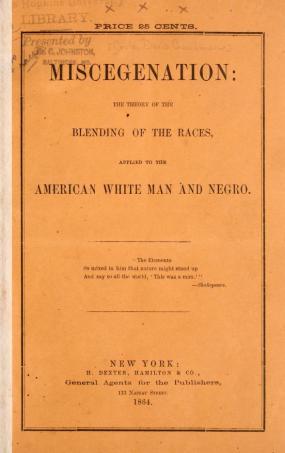Who Coined the Term "Miscegenation"?
Posted on

"The Emancipation Proclamation: Copperheads Respond," by historian Julie Golia, is the latest in Brooklyn Historical Society's blog series called The Emancipation Proclamation: Americans Respond.
"The American political landscape was marked by many different and complicated factions during the Civil War. One group, often dubbed 'Copperheads,' remain the most misunderstood. Copperheads were Unionists affiliated with the Democratic party who opposed the Civil War. For reasons including a fear that emancipated slaves entering the labor force would threaten the livelihoods of northern white workers, Copperheads called for immediate peace with Confederate states – essentially on Confederate terms, which meant maintaining southern slavery...
Historians have debated how influential Copperheads were in shaping the political landscape during the Civil War. Certainly they shaped the lexicon around which Americans discussed and continue to discuss race. For example, Copperheads were responsible for creating and popularizing the word 'miscegenation' during the 1864 presidential election."
The word miscegenation comes up rather frequently for CBBG as this project explores the history of mixed heritage people and families: for example, when talking about anti-miscegenation laws that restricted interracial couples from marrying, and Loving v. Virginia (1967) the Supreme Court case that declared such anti-miscegenation laws unconstitutional.
Golia goes on to explain how a Copperhead-orchestrated election-year spectacle left this made up word miscegenation in our lexicon:
"In December 1863, a pamphlet entitled 'Miscegenation: The Theory of the Blending of the Races' hit newsstands. Seemingly written by an anonymous Radical Republican [pro-Lincoln, anti-slavery], it advocated the intermarriage and blending of the races until race was indistinguishable. To most mid 19th-century Americans – even those who opposed slavery – these ideas were seen as dangerous and revolutionary. Unsurprisingly, it prompted fear among the populace, inflamed tensions during an election year, and caused confusion and discord among Republicans and abolitionists. The pamphlet turned out to be a Copperhead hoax. It was written by two employees of the New York World – another Democratic newspaper with some Copperhead leanings – and was meant to hurt Lincoln’s re-election efforts and embarrass abolitionists. Yet the word 'miscegenation' stuck, in ways that continue to shape Americans’ public and private lives into the 21st century."
Read the full post here.
View the original pamphlet "Miscegenation: The Theory of the Blending of the Races" here.

